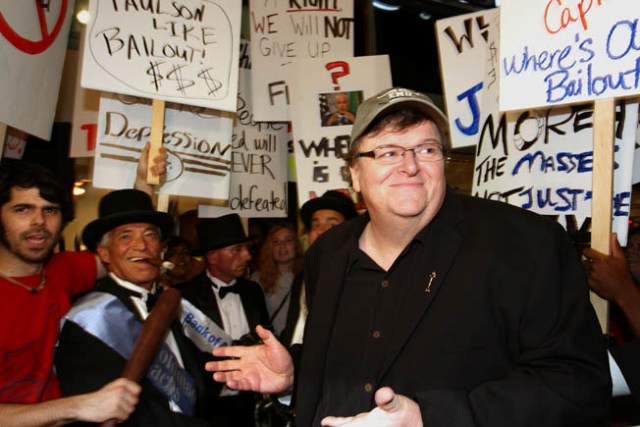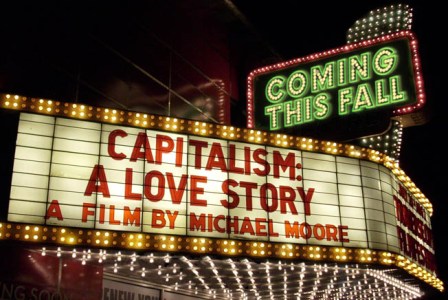CHICAGO – Patrick McDonald of HollywoodChicago.com appears on “The Morning Mess” with Dan Baker on WBGR-FM (Monroe, Wisconsin) on March 21st, 2024, reviewing the new streaming series “Manhunt” – based on the bestseller by James L. Swanson – currently streaming on Apple TV+.
Interview: Michael Moore on Detroit, Obama, Health Care, ‘Capitalism: A Love Story’
CHICAGO – One of the most divisive filmmakers in the history of the medium recently sat down with me for a very exclusive one-on-one interview. The free-flowing conversation went all over the sociopolitical map, discussing the accomplishments of President Obama in his first eight months, the salvage-ability of Detroit, the health care debate, and his new movie “Capitalism: A Love Story”.
“Capitalism: A Love Story” focuses on several aspects of our current economic crisis, pointing fingers at both Democrats and Republicans, but mostly the big business that has been allowed to run rampant with bad mortgage loans and government bail-outs. To Moore, the film is still mostly about economics and the problems with our current system.

Capitalism: A Love Story
Photo credit: Overture Films
Moore says, “This was my challenge with this film. After twenty years of this, I didn’t want to do the same thing. “Where’s the next issue? The next bad guy?” How about I do a film on economic theory but made it interesting, exciting, damning, funny, and all of that and get people to see it on a Friday night? Is that possible? I’m so proud of this film. I think it’s possible for a filmmaker to take any subject and construct a good film around it or about it.”
 Capitalism: A Love Story Photo credit: Overture Films |
Being from the Flint area and with what has happened to the auto industry needing to be such a major part of “Capitalism: A Love Story,” the conversation opened with a discussion of the shattered city of Detroit, one that Moore himself admits may be too far down the road to be saved. And if it is, well, “Every century has its ghost towns. The way Michigan is right now, the chance of it getting worse is great.”
What Detroit needs, according to Moore, is “real jobs. Not casino jobs. Real jobs.” It’s a solution for the entire country. He continues, “I think people should see Detroit as the canary in the coal mine. We should have seen that a long time ago. That’s what I’m saying. It may be a little late now. Not just for Detroit, but for other places as well. We need some leadership. We need some people with vision. Obviously, Pittsburgh was a horrible place and then somebody had some vision. But there are not a lot of those people. I’ve come to learn that. You always think there’s a whole lot. Twenty years ago, I thought there’d be a lot of documentaries like mine being made right now. I’m kind of surprised that there aren’t.”
With a movie as current as “Capitalism,” there’s naturally a concern that the issues could change while it’s being delivered to your local AMC theater. When asked if he worries about locking the film in too early, he says, “A little bit. Because I’m really dealing with a more general issue and not a specific incident, then I don’t really have to worry about it that much. It is a problem with documentary filmmakers. With Hoop Dreams, where do you stop the story? We get into that a little bit. But at some point you have to say, “Here’s the movie. Here’s the story I’m going to tell.” I work on the film right up until the end. I was working on it five hours until I went up to Venice. The sound. I couldn’t really change picture.”
 Capitalism: A Love Story Photo credit: Overture Films |
A major focus of the film is the conflict surrounding the word socialism, a hot-button subject that lit on fire when it became the focus of what Obama said to Joe the Plumber - “…he was essentially describing the basic tenet of socialism - spread the wealth around. So they just didn’t make it up.”
But conservatives like Glenn Beck jumped on the concept of socialism “Because they thought people would respond to the “BOO!” You know, they forgot statistics and that humans don’t live forever. Anyone who was sixty and voted for Reagan in 1980 is DEAD. They’d have to be ninety. There’s some. A few. But, basically, they’re all gone. So all the “Cold Warriors,” all the people of that age who helped put Reagan in office, they’re gone. Young people, when you go “Socialism,” it’s not “Boo!”. It’s “Hmmmm…””
“It doesn’t work and they get all defensive about capitalism. Those are two words that we never heard in normal discourse until this past year. And it’s REALLY helped the film. Here, I was going to use them when they weren’t being used and, all of a sudden, four months into the film, they start using them. I’m going, “Here’s a gift.””
Moore understands the concerns and criticism about what Obama has (or, more accurately, has not) accomplished in his first nine months in office, saying that “It should be more like “Yes We Will”” than the infamous “Yes We Can”.
He explains his feelings about the frustration, “Well, that’s because we were SO exhausted after eight years and everybody just wanted change immediately. But we know what the reality is. We’ve got the best guy we can get in there right now. He’s a smart guy. He comes from the working class. He’s gonna do right by us. I believe.”
 Capitalism: A Love Story Photo credit: Overture Films |
Now that he’s done with “Capitalism: A Love Story,” Michael Moore plans to get back into the debate surrounding health care. “I’ll try and get it revved up. They revved it up on the other side. Didn’t take much really. Took Glenn Beck really. A few other crazy people. They’re the minority. We’re the majority. The New York Times today - two-thirds want this public option. Seventy-five percent want some form of health care. Fifty-one percent support single payer. What’s going on? Obama’s mistake here is that he started with a compromise position. You don’t start with a compromise. You start with what you want. Then you get the base excited. No one’s going to get excited about the public option. You’re not going to have demonstrations - “Yeah! Public option!””
Before he left, Moore discussed a bit about his concerns for safety - the studio is more worried than he is about the death threats but he was more scared after his controversial Oscar speech for “Fahrenheit 9/11” - and even promised to do what he can to get “TV Nation” out on DVD.
Ultimately, Michael Moore is the kind of interview subject where hardly any amount of time would be enough to cover all the potential subjects. That’s what his movies are for. Love him, hate him, Michael Moore isn’t going anywhere and, on both sides of the debate, people that passionate are essential to the public discourse. Join in the discussion and see “Capitalism: A Love Story,” opening today, October 2nd, 2009, in Chicago.
 | By BRIAN TALLERICO |



Inconceivable points. Sound
Inconceivable points. Sound arguments. Keep going the truly amazing work.medication dispensing service